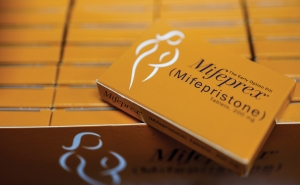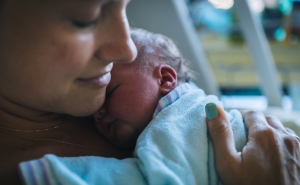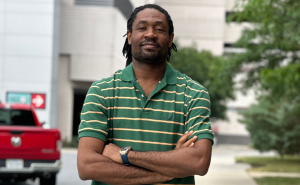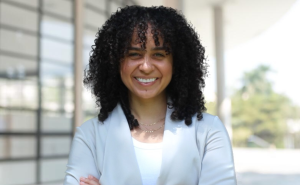Internship Spotlight: Zoey Hall
Through the Diversity Summer Internship Program for Undergraduates, Zoey Hall is interning in the Department of Biostatistics.
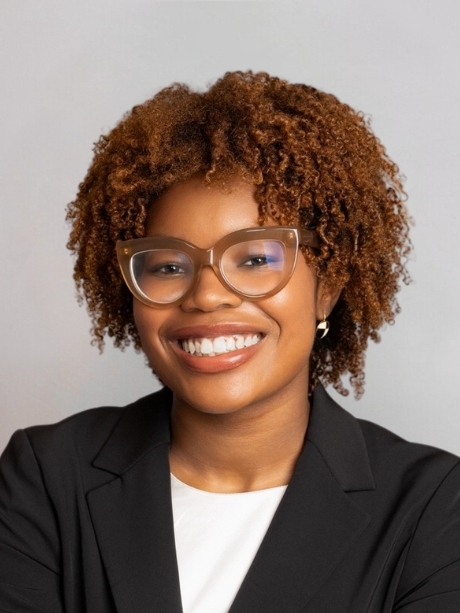
Department of Biostatistics intern Zoey Hall is a Vivien Thomas Scholars Initiative Summer Fellow in the Diversity Summer Internship Program for Undergraduates (DSIP). DSIP is an 8-week summer program that provides highly qualified undergraduates with graduate-level research experience in the biomedical or public health field.
Through DSIP, Zoey is interning in the Department of Biostatistics under the supervision of Nilanjan Chatterjee, PhD, and in collaboration with Mei-Cheng Wang, PhD, where she is working on research related to the Boston Birth Study Cohort. On working with Zoey, Chatterjee said, "I am really pleased to see Zoey's excitement about learning new analytic skills and how that aligns with her long-term goal to impact maternal and children's health in understudied populations."
Zoey, who is originally from St. Louis, Missouri, is a Karsh STEM Scholar and rising sophomore at Howard University majoring in Computer Science with a minor in Maternal & Child Health. Zoey’s interests are in Black maternal health and Black postpartum health through the lens of data science.
What led you to apply for the Diversity Summer Internship Program (DSIP) at the Johns Hopkins Bloomberg School of Public Health?
I was connected with DSIP through the Karsh STEM Scholars program at Howard University. Part of our program is to undertake internships connected to our research interests, and afterwards earn a PhD. My director at Howard, Ron Smith, nominated me for DSIP through the Vivien Thomas Scholars Initiative. Together we looked at several programs to decide which would best align with what I want to do and the DSIP program presented itself as the perfect avenue as I have the ability to work in public health as well as biostatistics.
What interested you in interning with the Bloomberg School Department of Biostatistics?
I’ve never been to a university or institution where biostatistics was under the public health umbrella, and I thought that was really great. When I signed up for the program, I listed my interests as epidemiology, biostatistics, and child and maternal health, and DSIP placed me with Dr. Chatterjee’s lab.
In general I am pretty new to the analysis side of biostatistics. I have a lot more experience working on the front end and interviewing people, and I felt like if I wanted to go into biostatistics, specifically data science, there is a lot of technical background I need to learn.
Tell us about the work you are doing in your internship.
When I started, Dr. Chatterjee listened to my interests and then aligned me with Dr. Wang who is working on the Boston Birth Study Cohort—one of the largest and longest studies related to Black, indigenous, or people of color involving women and children in the country. My job is to work with polygenic risk scores (PRS), trying to figure out what genetic risk factors mothers have that could pass on to their children and possibly contribute to the children having ADHD. I’m not sure what my final research question will be; usually my projects are about providing all the information I have down on a poster. I’m excited to see how I will whittle it down to one specific question that can answer everything I’ve learned.
How has the Department been working with you and supporting you and your work during your internship?
Dr. Chatterjee and Dr. Ziqiao Wang, a postdoctoral fellow in the Department who Dr. Chatterjee is advising, have been teaching me about PRS and how to use the programming language R, which is used in multiple fields including data analytics. I really like learning R and am excited to start analyzing the data and to see what the end result will be.
Dr. Chatterjee has been a really great mentor. We check in at least once a week and he’s always very quick to answer my emails. We meet and check over conceptual things I’m working on, and he is helping me prepare for my research paper. Also, being in Dr. Chatterjee’s lab, there are a lot of PhD candidates and postdocs who have been kind enough to take me under their wing; it is a really good space. Dr. Ziqiao Wang has been really wonderful, taking the time to teach me the foundation of genome-wide association studies (GWAS). I am looking forward to working with Dr. Mei-Cheng Wang after I gain access to the Birth Study data set.
How did you get interested in public health? What area of public health would you like to work in after you graduate?
I originally wanted to be a gynecologist, but while doing the summer medical program at Washington University in St. Louis I learned a lot about public health, a sector I wasn’t very familiar with. Following that, during my senior year I did my civic engagement project on the Black maternal health crisis. While researching my project, I came across the website for the Reproductive Health Impact (RH Impact), which has since closed, and saw they had a data analyst on staff. This job I realized combined everything I love: statistics, computer science, knowledge about gynecology, and women’s health. At the same time I was applying for Karsh and realized that not only do I want a PhD, but I need a PhD if I want to do this type of work.
After I graduate, I plan to get my PhD in either data science or biostatistics, in order to become a data scientist who works on clinical studies related to Black maternal health. Before this internship I was strictly looking for data science programs because I didn’t realize how close biostatistics was to data science, and how biostatistics actually goes more in depth and is used to address more questions related to the biological and health science field.
Ultimately, I want to be able to analyze chaos data collected in trials or treatments, targeted for Black maternal health, with the goal of passing it on to legislators and policymakers who can use it to make informed and impactful decisions towards correcting the Black maternal health crisis.

